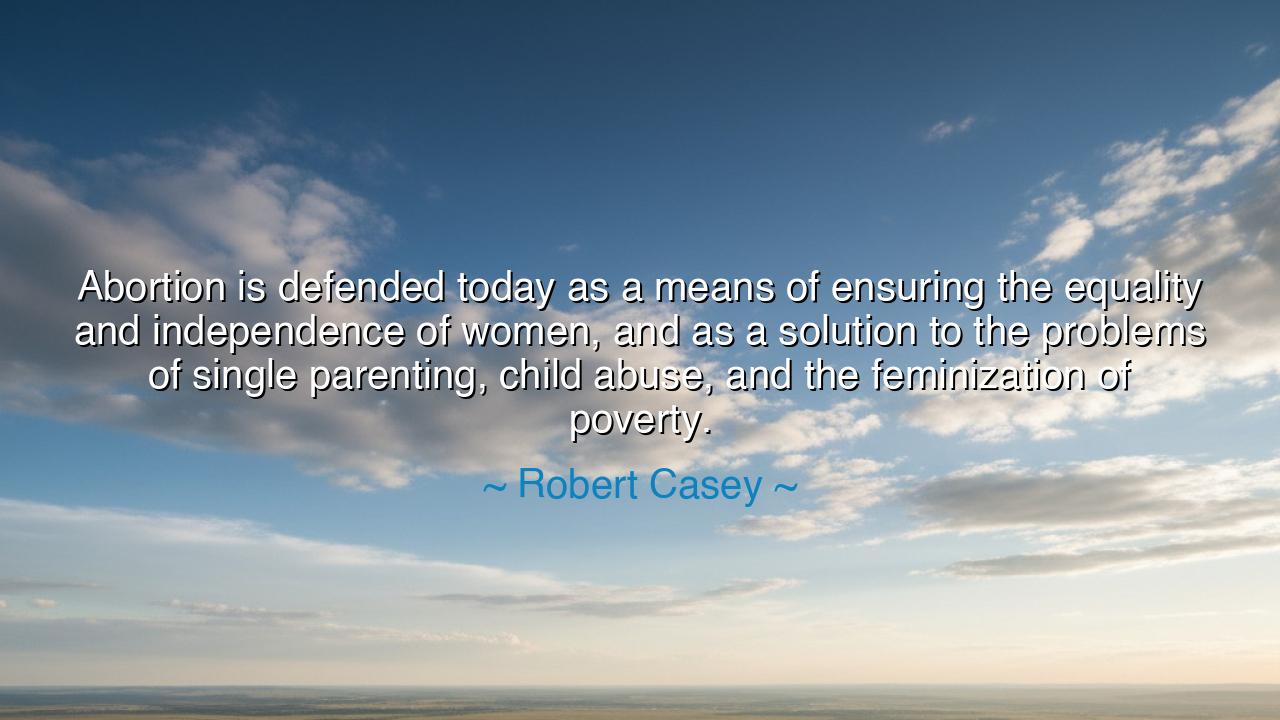
Abortion is defended today as a means of ensuring the equality
Abortion is defended today as a means of ensuring the equality and independence of women, and as a solution to the problems of single parenting, child abuse, and the feminization of poverty.






The words of Robert Casey echo with the resonance of a man who sought to wrestle with one of the most profound and contentious issues of his time. In saying, “Abortion is defended today as a means of ensuring the equality and independence of women, and as a solution to the problems of single parenting, child abuse, and the feminization of poverty,” he lays bare the reasoning often placed at the foundation of modern defenses of the practice. His voice, shaped by both his Catholic faith and his role as Governor of Pennsylvania, sought to pierce through the arguments of expediency and justice, asking his generation to consider whether the path chosen to address social ills honored life at its most fragile.
In his words lies the recognition that abortion is more than a personal act—it is a mirror reflecting society’s values. By invoking terms such as equality, independence, and poverty, Casey points to the deeper social struggles that frame this debate. He suggests that the act is not only justified as a personal right but also as a societal remedy for challenges that appear insurmountable. Yet, his phrasing carries a tone of lament, as though the solutions offered—though cloaked in noble language—mask an abandonment of deeper responsibilities.
Consider the story of ancient Rome, where unwanted infants were often abandoned at the city gates. Such acts were justified by economic hardship or by the desire to ensure the survival of the family. Yet over time, Christian communities took in these forsaken children, raising them as their own, testifying that care, not discarding, was the path of true civilization. Just as then, so now, societies must ask: do we ease hardship by eliminating the vulnerable, or do we restructure our lives and institutions to uphold them?
Casey’s mention of the feminization of poverty reveals a keen understanding of how women, disproportionately burdened with raising children alone, suffer under unjust systems. His words challenge future generations not to accept the narrative that the solution is to erase the child, but rather to confront the roots of poverty, abandonment, and inequality. To ignore these roots, he warns, is to shift the cost onto the voiceless.
The emotional weight of child abuse and single parenting further underscores the pain embedded in this issue. The world has known countless mothers who, left unsupported, bore immense burdens in silence. Yet history also recalls women like Sojourner Truth, who bore the wounds of slavery and poverty, but raised her children with strength and dignity, never ceasing to call upon society to reform itself rather than destroy the fruit of life. Casey’s wisdom is thus a reminder: it is not the children who are the problem, but the structures that abandon the weak.
The lesson here is profound: when a culture justifies life’s ending as the only remedy to suffering, it risks blinding itself to more just and merciful solutions. A people must ask not, “How can we remove the burden?” but “How can we bear the burden together?” For in bearing it together, we forge the bonds of a more enduring and compassionate society.
For those who hear this teaching, let the call be clear. Support mothers not with words but with tangible aid. Protect children not merely in theory but through institutions that nurture them. Confront poverty not with expedient remedies but with reforms that honor human dignity. And above all, cultivate a culture where equality and independence are not purchased at the cost of the most vulnerable lives, but are secured through justice and solidarity.
Thus, the teaching of Robert Casey becomes both a warning and a guidepost: beware the solutions that seem simple but sacrifice the innocent, and strive instead for a world where burdens are shared, lives are cherished, and the weakest are not abandoned but embraced. For only then will a civilization truly stand tall, its foundation unshaken by the storms of time.






AAdministratorAdministrator
Welcome, honored guests. Please leave a comment, we will respond soon